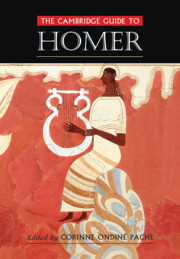Book contents
- The Cambridge Guide to Homer
- The Cambridge Guide to Homer
- Copyright page
- Contents
- Figures
- Notes on the Contributors
- General Introduction
- Part I Homeric Song and Text
- Introduction
- Homeric Epic in Performance
- Homeric Poetics
- Homer in a World of Song
- Epic Traditions
- Mythic Background
- The Language of Homer
- From Song to Text
- Key Topics
- Part II Homeric World
- Part III Homer in the World
- Bibliography
- Index
- References
The Language of Homer
from Part I - Homeric Song and Text
Published online by Cambridge University Press: 22 February 2020
- The Cambridge Guide to Homer
- The Cambridge Guide to Homer
- Copyright page
- Contents
- Figures
- Notes on the Contributors
- General Introduction
- Part I Homeric Song and Text
- Introduction
- Homeric Epic in Performance
- Homeric Poetics
- Homer in a World of Song
- Epic Traditions
- Mythic Background
- The Language of Homer
- From Song to Text
- Key Topics
- Part II Homeric World
- Part III Homer in the World
- Bibliography
- Index
- References
Summary
This chapter is an overview of the typical features of the language of the Homeric poems, prosodic, dialectal, syntactic, and semantic. It argues that the archaic and dialectal elements in Homeric diction are due to deliberate choice on the part of the poets in the tradition to a greater extent than is commonly supposed in the wake of Milman Parry’s theory of oral-formulaic composition.
- Type
- Chapter
- Information
- The Cambridge Guide to Homer , pp. 70 - 79Publisher: Cambridge University PressPrint publication year: 2020

